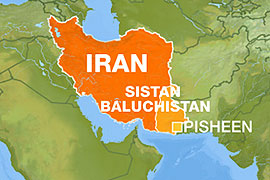Iran officers die in suicide attack
Suicide blast kills 35 people including 11 Revolutionary Guards’ commanders.

Ali Larijani, Iran’s parliamentary speaker, confirmed the deaths in an address to parliament.
“We express our condolences for their martyrdom … The intention of the terrorists was definitely to disrupt security in Sistan-Baluchestan province,” Larijani said.
West blamed
A Sunni group called Jundallah (Soldiers of God) claimed responsibility for the attack, according to state media.
The group has been accused by Tehran of launching regular attacks in the province and is strongly opposed to the predominantly Shia government.
Abdul Sattar Doshoki, a Baluchi political analyst, told Al Jazeera: “This is not totally out of the blue. It was expected because Jundallah have issued a statement saying they were going to carry out a suicide attack against those who align themselves with the Revolutionary Guards against their group.
“This is something the Revolutionary Guards did not expect, and the security there was rather relaxed. Jundallah has probably gained the upper hand in this instance.”
| In depth | |||||||||
|
Mohammad Marandi, an assistant professor at the University of Tehran, told Al Jazeera that officials suspected the group was linked to Saudi Arabia, the US and Britain.
“Iranian officials are very confident that the terrorist group behind the attack was funded by the Saudis and supported by the Americans and the British,” he said.
“I think the greatest blow [from this attack] is to any Iranian trust with regards to the Americans.
“On the one hand, the Americans are talking about rapprochement and building a new future, yet at the same time we see the Americans supporting groups in [Iran’s] Kurdish regions as well as in Sistan-Baluchestan.”
But Washington denies involvement with the group and condemned the attack soon after it occurred.
“We condemn this act of terrorism and mourn the loss of innocent lives,” Ian Kelly, the US state department spokesman, said in a statement.
“Reports of alleged US involvement are completely false.”
Regional concerns
Ali Nouri Zada, the director of the Arab-Iranian Studies Centre in London, dismissed suggestions Jundallah was being supported by Saudi Arabia or the West.
|
“The Guards will give a very harsh and crushing response to this group, so the group will never be able to launch another act like this in the country” Mohammad Pakpour, |
“It’s very easy to point at Saudi, to the British and Americans, [but] Jundallah is considered a terrorist organisation by the Americans and British,” he told Al Jazeera.
“As far as the Saudis are concerned, the Saudis are very sensitive – they have minorities, they have Shia … and they are facing al-Qaeda themselves.
“It [Jundallah] is a local organisation. It’s very easy in Baluchestan to find weapons.”
Following the attack, Iran’s foreign ministry summoned a senior Pakistani diplomat in Tehran, Iran’s Press TV reported.
“The Pakistani official assured Tehran that his country would take all measures to secure its border with Iran,” it said.
Both Iran and Pakistan have in the past accused each other of supporting Baluch groups in each others’ territory.
Past attacks
Iran’s Sistan-Baluchestan region borders Pakistan and Afghanistan and has seen several clashes in the past between security forces and Sunni fighters.
Al Jazeera’s Nazanine Moshiri, in Tehran, the capital, said: “Just three weeks before [June’s] presidential elections there was a big explosion in that area, where 25 people were killed and more than 100 injured.
 |
“The head of Jundallah said that his group carried out the attack.
“The Iranians say that they are carrying out a duel war against drug-traffickers and Jundallah, which they claim is linked to al-Qaeda.”
Moshiri said that there was no suggestion that the blast was linked to the recent disputed presidential elections.
“What is common in this area is kidnappings, explosions and clashes between Jundallah and Iranian authorities,” she said.
“But what is very interesting is that this meeting that was about to take place was with senior commanders of the Revolutionary Guards. So this was potentially an extremely important meeting.”
The Revolutionary Guards vowed to hit back at those behind the attack.
“The Guards will give a very harsh and crushing response to this group, so the group will never be able to launch another act like this in the country,” General Mohammad Pakpour, commander of Guards’ ground forces was quoted as saying by Fars news agency.
